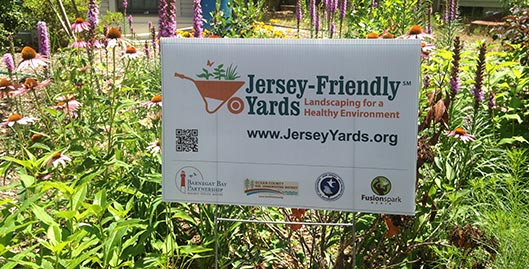Inspiration for a Jersey-Friendly Schoolyard

With the help of our talented partners, OCSCD put together a suite of Jersey-Friendly Yards inspired webinars, designed specifically for teachers and environmental educators, that guide you towards the creation of a Jersey-Friendly School Yard.
2021’s hybrid Environmental Educators Roundtable event offered 3 online Wednesday afternoon webinars in April. All programs were free – you can view them now on OCSCD’s YouTube Channel! Scroll below to read descriptions of each program, then click the link to watch a recording.
The Barnegat Bay watershed is a great place to live, learn, work and play. It’s up to all of us to keep our soil and water resources clean, and maintain healthy habitat for wildlife. A Jersey-Friendly School Yard can offer an inspirational space for teaching and learning about natural resources and the direct impact human behaviors have on the health of our community. Presenters use the 8 Steps to a Jersey-Friendly Yard resource to guide you through the “what, why, and how” process of creating a Jersey-Friendly School Yard.
Webinars
Watch recordings of our Jersey-Friendly School Yard webinars. Each one-hour webinar offers information, ideas and resources to get you started with creating a Jersey-Friendly School Yard. Presenters address various topics including planning and design, building a healthy foundation of soil, and selecting appropriate plants, as well as the important reasons “why” we should take action, change old behaviors, and work together with nature to ensure a healthy watershed.
Planning a Jersey-Friendly Schoolyard
Presented by Karen Walzer, Plublic Outreach Coordinator, Barengat Bay Partnership, and Becky Laboy, Education Outreach Specialist, Ocean County Soil Conservation District. Karen and Becky introduce you to the Jersey-Friendly Yards website including a variety of garden-building tools teachers can use with their students to begin the Jersey-Friendly School Yard planning process.
Discover the 8 Steps to a Jersey-Friendly Yard resource, and focus on Step 1: Plan Before You Plant, and Step 2: Start With Healthy Soil. A brief tutorial offers an introduction to the searchable Jersey-Friendly Plant Database, which houses over 400 plants to choose from for your Jersey-Friendly School Yard.
Why Choose Jersey-Friendly Yards? Understanding the Effects of Fertilizers on Eutrophication and Coastal Acidification
Presented by Kaitlin Gannon, Education Coordinator, Jacques Cousteau National Estuarine Research Reserve. Jersey-Friendly Yards, Step 4: Fertilize Less, brings awareness to non-point source pollution that is detrimental to water quality, and offers solutions. Eutrophication is pollution in the Barnegat Bay caused by excess fertilizer runoff from lawns and gardens, which leads to coastal acidification. Kaitlin will introduce educators to tools, resources and lessons that lead students to a better understanding of how our own actions can impact our environment. This data-driven program connects the dots between a Jersey-Friendly School Yard that reduces fertilizer inputs, and a healthy watershed for people and wildlife.
How Does A Rain Garden Grow?
Presented by Dr. Steven Yergeau, County Agent/Associate Professor with Rutgers Cooperative Extension. Introduce rain gardens to your students! This program talks about rain gardens as one way to help protect water quality and redirect stormwater back into the ground. Dr. Yergeau introduces the steps needed to plan and design a rain garden for your school or center’s property. Tools and resources are shared to help you on the road to having a Jersey-Friendly School Yard.
